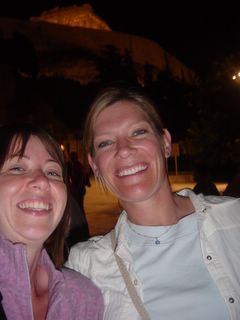In the footsteps of gods and heroes
Yesterday, Julie and I rented a motor scooter to further explore the island of Naxos, home of Dionysis, land of olive groves and beaches, site of what could have been the grandest temple to Apollo ever built (they never finished; probably got distracted by the nude sunbathers like we did). My prediction that we would both die in a fiery scooter crash thankfully did not come to pass and instead we traveled inland to Chalki. There, we visited a very old distillery which makes kitron, ouzo, and banana liqueur. Kitron is made by processing high-grade alcohol with the leaves of the kitron tree, a citrus tree with completely inedible fruit. Let the alcohol soak up the oils and essences of the leaves however, and you get a very delightful citrus liqueur which provides a nice break from the perils of riding on the back of a scooter (Julie: "maybe you should have a couple shots when we get there so that you'll relax a little"). The distillery has been in use since the mid-1800s and we were given a delightful introduction to the business by a 4th generation kitron master. He also showed us how ouzo was made - I didn't realize that the famous drink was the result of alcohol processed with anise seed, fennel and coriander. Following our scootercapades, we spent a last windy hour at the beach. The beaches in Naxos could really be beaches anywhere, except for the Zorba-like character hawking sea sponges from his basket as he walked down the sand, or the amazing clear warm water, or the large pink men in little speedos (I swear, only in Europe), or the beachside bars offering all matter of cold fruity drinks, or the completely relaxed come-what-may attitude that must surely exist in its pure form only in Greece. A few words about the food. I haven't eaten a single thing on a stick since arriving in Istanbul almost two weeks ago. Given that sis kebab and souvlaki are both typically cooked on sticks, I was a little surprised. There are a lot of similarities between Greek and Turkish food, just like their culture, and the result of many years of power and cultural exchanges between the two (in fact, Istanbul was the capital of Greece for years and as recently as the 1920s, Greeks experienced mass relocations from their Turkish homes). The foods from both countries emphasize fresh ingredients, flame grilling, local products (lots of feta, honey, olives, etc), astounding stews, and lots and lots of sweets. I was pretty sceptical of one of those sweets, Turkish Delight, until Julie and I happened into the Istanbul Spice Market where we were invited into one of the booths, given apple tea and plied with Turkish Delight, a lovely, not-too-sweet, almost caramelly concoctious of nouget and nut that's bound to make you loose any resolve. (I've developed a new appreciation for poor Edmund in The Lion, The Witch... I'm not sure I wouldn't trade my brothers for more of that sweet treat.) Tonight in Athens we visited an ouzeri, just below the Acropolis. There, we had our pick of a number of tapas-like dishes: fried calimari, meatballs, greek salad, fried eggplant, stuffed vine leaves, stuffed peppers, fried fish, etc. In theory, the palate should be cleared between each bite with a dash of ouzo. In practice, beer works just fine too. Yum. So we did leave our island paradise for a couple of quick days in Athens. We've both been pretty overwhelmed by the amount of history, philosophy, religion, language, science, mythology and more at our feet in this place. Everywhere you turn there are all sorts of stones and markers signifying the place of this momentous contest (Athena and Poseidon on the Acropolis, vying for the right to name the city), and that famous speech (Socrates expounding his theories in the Agora). It's also interesting to contrast the ancient heroes and the present-day Paraolympics which began a few days ago. We'll marvel all those things tomorrow as we scale the Acropolis and wander around the Parthenon.

Look, it's the Parthenon! See it?

Look, it's the Parthenon! See it?

<< Home